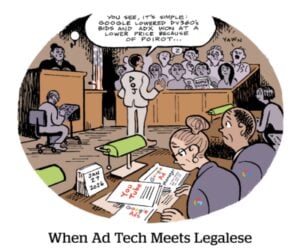Here’s today’s AdExchanger.com news round-up… Want it by email? Sign up here.
EA Or Nay?
EA Games is looking for a buyer, according to game news journal Puck. And the buyer will probably be a company with a streaming service.
After a (debunked) rumor saying Amazon intends to buy EA, its stock surged 15% in premarket trading when the rumor broke Friday morning.
The other top contenders for the gaming company are Disney, Apple and NBCUniversal, with the latter the most likely.
A video game blog claims Comcast CEO Brian Roberts wants to spin off NBCUniversal, which owns the streamer Peacock, and merge it with EA Games. But both companies declined to comment.
Still, Microsoft bought Activision, Netflix bought three game studios in only a year, and in-game advertising demand keeps growing. Clearly, streamers like the idea of slapping games into their content libraries to try and keep subscribers from leaving.
But EA Games’ new home – if it even moves – remains TBD for now.
The Court Of Public Opinion
Despite being a midterm election, political ad spend in the 2022 election cycle is already outpacing 2020.
From a cultural perspective, there’s always a “platform of the moment” during an election cycle, Digiday reports. And in 2024, TikTok is going to be what drives Gen Z voters to the polls, policy consultant Robb Henzie tells Digiday.
There’s one big problem: While TikTok is capturing the Gen Z zeitgeist, it’s a forbidden zone for political advertising. TikTok isn’t allowing creators to post any paid political content. TikTok already bans political advertising (though, apparently, it can be evaded).
During the last election cycle, in the midst of the pandemic, political spend on digital ticked upward, accounting for 19% of media electoral spending for 2020. And social platforms are only becoming a bigger piece of that chunk, though they’re also setting up higher guards. Meta, for example, is pausing political ads entirely to avoid the burden of filtering content.
But politicizing social won’t be smooth sailing. TikTokers can post organic political content, but advertisers might have a harder time using organic messaging on the platform at the same scale (although not for lack of trying).
Friends Without Benefits
A $31 billion class-action antitrust lawsuit filed against Meta with the UK’s Competition Appeal Tribunal will proceed after Meta declined to challenge the choice of forum. A class-certification hearing has been set for January 2023, TechCrunch reports.
The suit, which was filed in January this year, claims Facebook has imposed unfair pricing and trading conditions on its users in the UK (and, assumedly, everywhere else) by requiring users to share personal data to access Facebook’s platform. The suit further charges Facebook with not sharing profits earned from trading on that data with its users.
However, it is unclear whether the suit will survive class certification. Privacy concerns are at the heart of the claim. A UK Supreme Court decision last November held that damages resulting from privacy breaches must be proved on an individual basis, not through class action, a win for Google.
This lawsuit is just the latest anticompetitive case against Meta based on its data-gathering practices. Meta is appealing a decision by the German Federal Cartel Office that banned the company from linking user data across its different owned and operated platforms.
But Wait, There’s More!
Nielsen delays its work transacting with big data … and postpones its next meeting with the Media Rating Council. [MediaPost]
A Delaware judge orders Twitter to hand over its data following a whistleblower accusation. [WSJ]
The IAB Tech Lab finalizes its ad format guidelines for CTV and digital video. [release]
Instagram says precise location content tags cannot be used to track users’ exact location. [BBC]
South Carolina Governor says bill that would criminalize websites sharing information about abortion access “will not see the light of day.” [EFF]
Google launches online safety campaign in India and announces cybersecurity upskilling program for 100,000 developers. [Economic Times]
Google adds digital out-of-home advertising to Display & Video 360. [The Drum]
American Eagle eyes metaverse marketing to reach Gen Z. [Digiday]
HBO Max’s “House of the Dragon” already gets a season two renewal. [Variety]
















